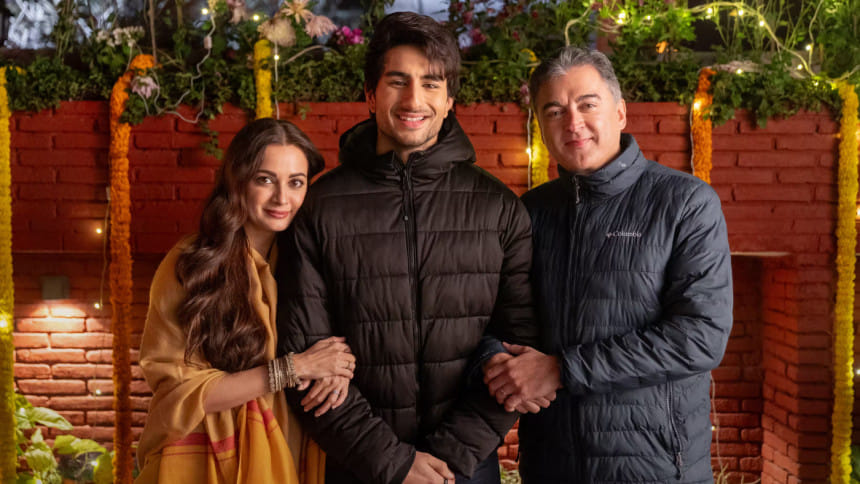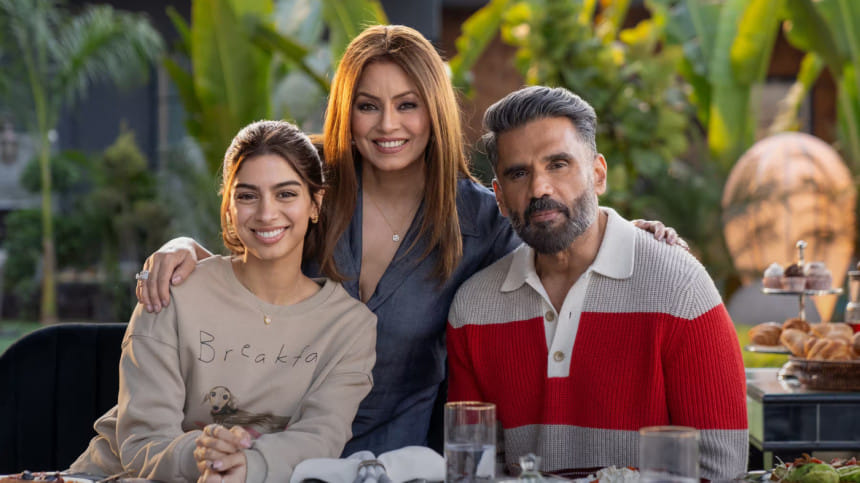‘Nadaaniyan’: It’s time for Bollywood to wake up to unskilled star kids

There is a great debate about nepotism in Hindi cinema. It's upsetting for everyone when clearly unskilled children of famous people are paraded as readymade movie stars, increasing the rift between the haves and the have-nots and highlighting the inequities of various systems across the screen. "Nadaaniyan", starring Khushi Kapoor and Ibrahim Ali Khan in the lead roles, is yet another example of this.
Directed by debutant Shauna Gautam and produced by Karan Johar, Apoorva Mehta, and Somen Mishra under Dharma Productions' subsidiary, Dharmatic Entertainment, the film is currently the top-viewed movie in Bangladesh on Netflix. Its opening notes are instantly familiar—Kapoor plays Pia Jaisingh, the lovable rich girl, following the blueprint perfected by Ananya Panday in "Call Me Bae" (2024).
There is even a similar voiceover telling us about Pia's wealthy yet broken family. However, while "Call Me Bae" was somewhat self-aware, "Nadaaniyan" – much like its overproduced and underwritten opening sequence – demonstrates a lack of understanding of the generation it claims to represent in every scene.

The film immerses us in a glossy world that resembles a role-playing video game more than a believable reality. The lead characters are portrayed as extreme stereotypes, and their dubbed lines awkwardly linger above the scenes, as if read from an off-screen teleprompter. Khan's Arjun Mehta, a career-focused student, delivers his dialogue with mechanical stiffness; his clipped words lack emotion, making it seem as though he is still rehearsing.
In this cinematic universe of Dharma Productions, Archana Puran Singh reprises her role as Ms Braganza from "Kuch Kuch Hota Hai" (1998). Love stories are shaped by generational wealth and inter-school competitions. But what is this specific film about, at its core? Nothing much.
The writing in Nadaaniyan is a significant issue. Conflicts escalate without clear reasoning or emotional depth. At one point, Pia reveals her mother's IVF struggles to Arjun, a boy she has just met, solely to persuade him to pretend to be her boyfriend in a far-fetched scheme. The dialogue feels unnatural and insincere. In one scene, while breaking up with a 'bad boy,' one of Pia's friends says, 'You were never worthy of my love.' Which affluent 18-year-old talks like this?
There is a noticeable lack of chemistry between Kapoor and Khan; their attempts at romantic exchanges come off as more painful than captivating. However, a subplot featuring Arjun coaching Pia for a debate competition offers a glimmer of hope, as their connection begins to develop during those sessions. Unfortunately, when we are finally supposed to hear Pia debate, the film falters; instead of highlighting her arguments, the scene is buried under music.

Even the songs in this film feel like placeholders. "Pag Ghunghroo Baandh Meera Naachi Re" pales in comparison to "Radha on the Dance Floor." The choreography is awkward; Khan's moves are clumsy, lacking the flair of Bollywood or the polish of "High School Musical," making one look back on "Student of the Year" (2012) as the 'good old days'.
The lead actors are ill-equipped to carry the film. They are far from the magnetic presence that Hrithik Roshan and Kareena Kapoor brought to "Kabhi Khushi Kabhie Gham…" (2001) or the quirky charm that Saqib Saleem and Saba Azad provided in "Mujhse Fraaandship Karoge" (2011). Despite the support from actors like Dia Mirza, who plays Arjun's mother, cheering him on, and the considerable resources dedicated to launching him, Khan's most notable quality at this point is his resemblance to his father.
In a debate competition, Arjun is expected to argue against democracy somehow. We are told he is a swimming champion, a trait that is never fully explored. He has a neatly curated vision board for life, but beyond displaying his chiselled abs, he seems utterly adrift, lacking any real direction or intellectual depth.

The screenwriting by Ishita Moitra, Riva Razdan Kapoor, and Jehan Handa fails to authentically represent youth culture. Telling young adult stories is undoubtedly challenging. The personalities portrayed on screen are not fully developed, and perhaps the target audience reflects that as well. Nonetheless, the fundamental responsibilities of filmmaking—such as constructing conflict, resolution, and tone—shouldn't be compromised in the pursuit of appealing to youth. Netflix's own shows, "Sex Education" (2019-2023) and "Heartstopper" (2022), exemplify how to do this effectively—writing teenagers with the insight of adulthood while acknowledging their genuine issues.
When actors like Suniel Shetty, Mahima Chaudhury, and Jugal Hansraj appear on screen, they should not overshadow the younger actors. Instead, these instances should inspire hope for a new generation ready to build on the legacy established by these veterans, offering fresh perspectives that even millennials sometimes fail to grasp.
Somewhere in this chaotic mess lies a nugget of a sweet high school romance that could have worked — a story that might have made you question whether prioritising academics over actively searching for true love was a mistake, or perhaps a musical that could have evoked memories of dreaming about casually bumping into and falling for your crush in the school hallways. But alas, this film does none of that.

 For all latest news, follow The Daily Star's Google News channel.
For all latest news, follow The Daily Star's Google News channel. 









Comments